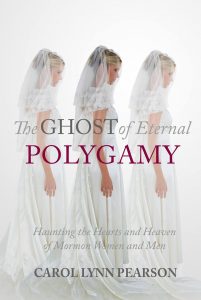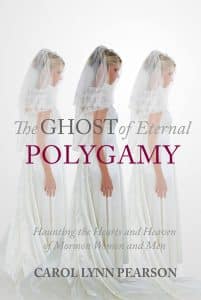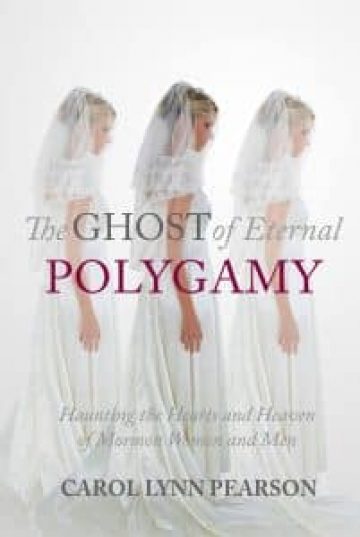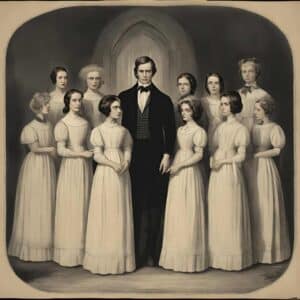
I have to start out by saying that I absolutely loved this book! There are several books out there about our church’s history on polygamy, but this is the only book out there (that I know of) that specifically addresses eternal polygamy.
This book is incredibly important because eternal polygamy is practiced in our church today. Though our church doesn’t practice polygamy anymore, it still allows a man to be sealed to more than one woman. This is still an instance of polygamy, even though the church will excommunicate any member practicing “earthly” polygamy.
The book doesn’t just talk about polygamy but also includes other sealing practices that have been problematic. I’m sure that many church members don’t know about some of these sealing practices since they don’t experience them. For example, I used to think that if a couple got divorced, their sealing was automatically canceled. Such is not the case.
In many instances, two people will marry and stay married forever. But what if divorce is involved? What if one spouse dies very early on in the marriage? What if someone remarries for time while still being sealed for eternity to someone else? These things do happen and this book addresses all of them!
The book is divided into different topics having to do with polygamy. In between each chapter is a section called “Other Voices” which contains the words of those who have suffered in some way from the current sealing practices. Some of the voices even come from local church leaders, such as bishops. Even bishops find this practice to be problematic. There are examples from active members and from those who have left the church because of the suffering these problems have caused them.
You will also learn a lot about our current church sealing practices in regards to not just women, but to how it affects the whole family. The main point the author makes throughout the book is that polygamy was not instituted by God. It was a mistake that men brought about. Pearson says that, in our church, we never talk about our prophets or church leaders as making mistakes. But Joseph Smith and Brigham Young are not exempt from making mistakes. They were good people, but they made an error with polygamy. Pearson doesn’t condemn our past prophets, but acknowledges that they have made errors at times. She loves Joseph Smith but is also heartbroken by his introducing polygamy into our church.
I especially love Chapter 3: The “Why” of Mormon Polygamy. Pearson lists fourteen reasons that are used to explain the “why” of polygamy. She expounds on each reason and debunks them all. One reason she refers to is how polygamy was a way for God to command an Abrahamic sacrifice from the saints. Pearson tells us that polygamy is different from Abraham’s sacrifice, because “Isaac is spared the blow. Mormon women are not” (64).
The book is filled with many interesting stories. Here is an example:
“Earlier Joseph had insisted that Helen’s father Heber ‘surrender his wife, his beloved Vilate, and give her to Joseph in marriage.’ After some days of deepest anguish by Heber and by Vilate, the offering was made. Joseph rejoiced at Heber’s devotion to him and told Heber it was merely a test. Yes, God spared Abraham the sacrifice—God spared Heber the sacrifice—but God did not spare Lucy and Helen and thousands of other Mormon women the fully enacted sacrifice of placing themselves on the altar as directed by their prophet” (151).
I love some of the quotes the women in the 1800s gave about polygamy. Pearson did a wonderful job in researching this topic and bringing this information to light. In church we never talk about how polygamy made women suffer. “How Mormon women were made to feel under the trial of past polygamy and feel still under the fear of polygamy future is something that we have never looked in the face” (112). We talk about how it wasn’t forced on anyone and that only a minority practiced it. But the truth of the matter is that, back then, members were being taught that living polygamy was essential to enter the celestial kingdom.
When I was almost done with this book, I was feeling the weight of the things I had read. I felt that a change needed to be made—right now! And then I came to the second to last chapter, which is called “Toward a Partnership Future” and it gives the reader hope that changes will be made in the sealing practices soon. Once that happens, church members will be spared all the suffering that these practices have caused. Pearson lists three core beliefs and expounds on them in great detail. One belief she lists is, “A couple who chooses to marry in the temple can go into that holy place and stand on equal ground” (189).
I strongly recommend this book to every member of the church, especially those who are haunted by polygamy. I especially recommend it to those, like me, who feel that “Gender inequality in the church clouds almost everything for me right now” (181). It will give you hope that things will change.
I’ll end with these wonderful words by a 19th century woman: “Polygamy is alright when properly carried out—on a shovel.”
[amazonjs asin=”0997458208″ locale=”US” title=”The Ghost of Eternal Polygamy: Haunting the Hearts and Heaven of Mormon Women and Men”]






30 Responses
Thanks for the review. I loved this book. I need to buy a hard copy of this book so I can loan it out to friends.
I am curious what you think is going to happen to those of us that weren’t lucky enough to married? We are angels? Too bad for us? I have heard the argument that there will be enough men to go around but the facts just don’t support that. In every ward, in every LDS Church across the world, the single women outnumber the single men.
From my perspective, the whole idea of eternal marriage is filled with nothing but anguish. You are either single, surrounded by married people (and get to serve them), or you are sharing a man.
I am so sorry about the anguish you feel. In my opinion, I think that those who were not able to find someone to marry will be able to marry in the next life. It’s not their fault that they didn’t find someone, and I believe that God is fair. When I was single, this belief really comforted me, especially since I thought I would never be able to find the right person to marry.
You said that there aren’t enough men to go around. In that case, let me tell you something interesting a professor of mine once said. She was quoting a study and said that more males are born than females, but more male babies die than female babies. So if that’s true, then it seems that there will be enough men in heaven.
I think the only people who will be servants in heaven will be the people who reject marriage altogether. I don’t think people will be servants just because they didn’t find the right person to marry. That seems very unfair to me.
I am not disputing your professor. I would just like to know what data she was using? Infant mortality for natural reasons may well see more male than female deaths. However, in countries where infanticide is practised, especially when “unwanted” female babies are born, it may be the other way around.
I agree with you on the rejecting of marriage over just not being married.
Don’t forget that war has killed off a great deal of single men, too.
Personally, I think the afterlife will look like more of a web of interconnectivity than the patriarchal hierarchy that we get fed.
This is a reply to Andrew’s question:
Unfortunately I don’t know what data my professor was using. But I have read that females are more likely to survive at birth than males are. I read this in a book called Eve and the Choice Made in Eden.
In Brigham Young’s discourses, he states those who don’t marry for eternity while on the earth, will be the servants of those in the celestial kingdom. Also, read D&C 132:14-17.
In Jesus the Christ, by James Talmage, read chapter 31.
Unfair? Only if you believe the mind bending, confusing, teachings of false prophets. Believe in Christ, not man.
PS I did read the book. I didn’t really see any facts that would lead me to believe that polygamy was a mistake. It seemed more of a catalog of opinions about how hard it is – I get the feeling that our opinions don’t really matter. Doctrine is whatever it is.
Yes, it was composed of the author’s research and opinions, and also the experiences of those who filled out the survey. I don’t think there are facts actually proving that polygamy was a mistake. (That would be really nice if there were!) But the book shows how polygamy has hurt a lot of people and how it doesn’t make sense.
The author talked about how prophets can make mistakes. One example of a mistake that was being taught as doctrine is the Adam-God doctrine. It was being taught by Brigham Young. He believed that Adam was God, and for many years the church taught that. One of our hymns implied this teaching, but later the words were changed in the hymn, and the church announced that the Adam-God doctrine was false.
I see it as a ‘by their fruits ye shall know them’ situation. The fruits of the practice are just not sweet.
I feel like I have some skin in this game. My father was (is) sealed to both my mother and stepmother and expected to be with them both in the hereafter. Interesting, because my parents both opposed polygamy when my mother was alive and promised each other (I was told) that whoever was the longer-lived would never remarry. That said, my father was horrible at being single and outlived my mom by twenty years. He married my terrific stepmother and wanted us all there for the sealing, which was tactless and hard. However, my stepmother is wonderful and I love her to bits. I have no idea how this will be solved, but I feel better about it than I did at first. I still feel a little hostile to my dad…
Patty, I have to agree that was pretty cruel of your dad to expect his children from his first marriage to come celebrate an eternal marriage with a second wife. I think this eternal marriage doctrine creates as many problems as it solves…
On the other hand, being tied eternally to my lovely stepmom is a plus. I think the conversation between my own mother and my dad in the eternities must have been interesting. As with many other things, I am comforted by all things being made clear in the next life and the small pieces of truth we have being fitted into the large, complete and satisfying whole that I can’t see now. Faith, not for sissies! I hope this doesn’t seem to facile to you, it helps me.
“The main point the author makes throughout the book is that polygamy was not instituted by God.”
I find that interesting since the Bible says otherwise. Neither Abraham nor Jacob were sanctioned for their polygamous marriages. Their children are all children of the Covenant. Is she really suggesting that Rachel, Bilhah and Zilpah will all be left to find other husbands? Rachel the one Jacob truly loved will not be his, because he was forced into marring Leah first?
I don’t think we have enough revelation to know the eventualities of what Godhood is. We know that Godhood requires a Man and a Woman – we do not fully understand what happens if a man has two (or more) women. Writing a book saying it is all wrong doesn’t make it wrong.
Yes, I agree, some of the results of sealing are not always welcome, if not despised. However, these are thankfully the minority and I believe in a God for Whom nothing is impossible. Whilst I believe in the eternal consequences of our actions I am not sure that I believe there is eternal inevitability. I believe that God, knowing the hearts and minds of His children can make the most of the lives we live.
I know a women who, whilst pregnant with her second child, lost her husband to whom she was sealed. This happened many years ago when she was in her early twenties. She re-married a very good man, they knew they could not be sealed. She had two more children, sealed to the mother and the first husband. Those children have been married in the temple and have children of their own now.
The second husband made a choice, he could not be sealed and has no chance of receiving the blessing given in the that ordinance should he die before she does.
How the Lord will deal with this I do not know. Two Dads, four children and one mother.
What I don’t believe is that a man who took on another man’s two children, brought up two of his own, served as a Bishop (despite not being sealed) is going to be stopped from his exaltation because of a choice he made in early adulthood. So there are consequences – he might not be sealed to his wife (depending on the first husband), his children may not be sealed to him (but I believe child – parent sealing to be a nicety rather than an eternal concept). However, I do not believe this will lead to the inevitability of his not being exalted. After all, “Greater love hath no man then he lay down his life for his brother.” And that is what he did in taking on this family, raising them, supporting them, and serving in the Church.
Bilhah and Zilpah were concubines–slaves forced to have sex with their master. I certainly hope God would not doom them to this fate for eternity.
April, why do you never answer a simple question with a simple answer. You always seem to look for a failing and go for that. Let’s take Bilhah and Zilpah out of it – even though your assumptions are just that, you have no way of knowing their feelings.
Leah and Rachel are sisters, and both was married to Jacob. So it would appear this was a polygamous marriage acceptable to the Lord.
Andrew, I answered your multi-paragraph response with a one line response, and you say that I am not answering simple questions in a simple way?
I was disputing that the Lord didn’t sanction polygamy, I cited the Abraham and Jacob. Instead of making a comment about the fact that Leah and Rachel both wives you hit me with the Bilhah and Zilpah were forced. Quite apart from the fact that you don’t know to be the case it didn’t answer the question. If polygamy is man made why did God use it as a means to establish the House of Israel?
You asked,
Is she really suggesting that Rachel, Bilhah and Zilpah will all be left to find other husbands?
I answered,
Bilhah and Zilpah were concubines–slaves forced to have sex with their master. I certainly hope God would not doom them to this fate for eternity.
I’m not sure why we have a section in D&C that talks about polygamy as a revelation from God. But I know that in Joseph Smith’s time the culture was different, and that Joseph was interested in connecting the saints together. He also read about polygamy in the Old Testament and wanted to bring that part of the old culture back. Joseph Smith wrote that revelation on polygamy because he was trying to convince Emma Smith to go along with it. She was very opposed to polygamy because she felt betrayed. Joseph had Hyrum Smith bring her the revelation, which was very mean of him to do.
Also, back then, they didn’t see the Celestial Kingdom the way we see it now. They viewed it as a hierarchy and that if you were sealed to a prophet you would be higher up. Nowadays we know that’s not true, but that’s what they used to believe. Also, they would do adoption sealings. Young men were being sealed to the church leaders as their “sons.” Since the church leaders back then were all converts, they didn’t have lines of ancestors sealed to them, like some of us do today. That’s why, I believe, they were so focused on polygyny and adoption sealings.
Are there any other sections of the D&C that I should discount because they are not revelations but Joseph’s ideas?
Great question, Andrew. There are lots of things in scripture that are the opinions of the authors mingled with inspiration from God. Some would say we have to accept everything or reject it all. I think we can prayerfully rely on the Spirit to help us separate the wheat from the tares that are allowed to grow alongside each other. We’ve got great tools to do this with as we believe in neither scriptural nor prophetic inerrancy. We can determine what is the culture of the time that God lets slide and what is actual doctrine.
Andrew, you might also want to read the book Women in Eternity, Women of Zion, by Valerie Hudson. There’s a section in there on polygamy, but she takes a different view. She agrees that polygamy was instituted by God, but that it is an exception and not the rule. This is more similar to your views.
I think the case for it being an exception is already established doctrine – per the Book of Mormon.
I would point out that at 51 if my wife were to die I have no desire whatsoever to try to share my life with anyone else. I have been married for nearly 32 years. I have seven children and, so far, 5 grandchildren. I do not believe I will be lonely and I don’t believe at this point any marriage would be what I have now.
Polygamy is a huge stumbling block for my wife. She doesn’t like the concept at all. Our previous bishop’s wife, and now Stake YWP, is in favour of it entirely. She would have no issue if it returned, and certainly is bothered by it in the eternities.
I believe in a God who will allow what people feel comfortable with in the eternities.
Hi Andrew, I’m glad you wouldn’t want to practice eternal polygamy. Yes, I can see how polygamy can be a stumbling block. I’ve struggled with it ever since I learned about it in junior high. When I got married, I made my husband promise me that if something were to happen to me, he would remarry for time only, and not for eternity. I believe this is a great way to set someone’s mind at ease.
“I believe in a God who will allow what people feel comfortable with in the eternities.”
I completely agree with this statement.
Also, an interesting show to watch is a TV show called Polygamy USA. It’s about modern people living polygamy and how their day-to-day lives are. There was one family with a husband and two wives. The wives kept saying that they were okay with polygamy, but you could tell that they constantly struggled with jealousy. Also, one very interesting thing was that in their community, women are the ones who choose who they want to marry. Men can’t date, but have to wait until a woman chooses them. It was pretty interesting.
Dani,
I think it is quite well established, in the D&C, though perhaps wasn’t implemented as well as it should in reality, that the first wife makes the choice.
I also think that if Eternal Polygamy is a thing that we have all witnessed it as spirit children of Heavenly Parents. Heavenly Mother(s) could be sitting in Heaven thinking, “why do they all have such a problem with it?”
If that is the case we may all already be ready for Eternal Polygamy.
Thanks for the review, Dani. This sounds like a book I should read. I’m curious to know if Carol Lynn Pearson makes any speculations about marriage in eternity, other than women and men standing on equal ground. It sounds like she’s saying marriage necessarily needs to be one-to-one (could be two women and two men, also, why not?). This means that in cases of serial marriage on earth, partners will ultimately have to choose. It can’t be “all worked out in the end” without some potentially heartbreaking choices. Unless God clones some people (kidding). This is one of my sticking points with doctrine of eternal marriage, and in some ways I think the mainline Christian view of there being no marriage in the afterlife sounds more humane.
” This is one of my sticking points with doctrine of eternal marriage, and in some ways I think the mainline Christian view of there being no marriage in the afterlife sounds more humane.”
That is a very interesting comment. I am actually shooting for the Terrestrial kingdom because think it sounds much more human. Everyone is equal.
The Terrestrial Kingdom for me, please!! Eternal polygamy sounds like more hell than heaven.
[…] of the overtly sexist language and actions. Now, Eve covenants directly to Elohim, but just as the Ghost of Eternal Polygamy haunts the temple, the concept of salvific coverture lingers on. While previously Eve was anointed […]